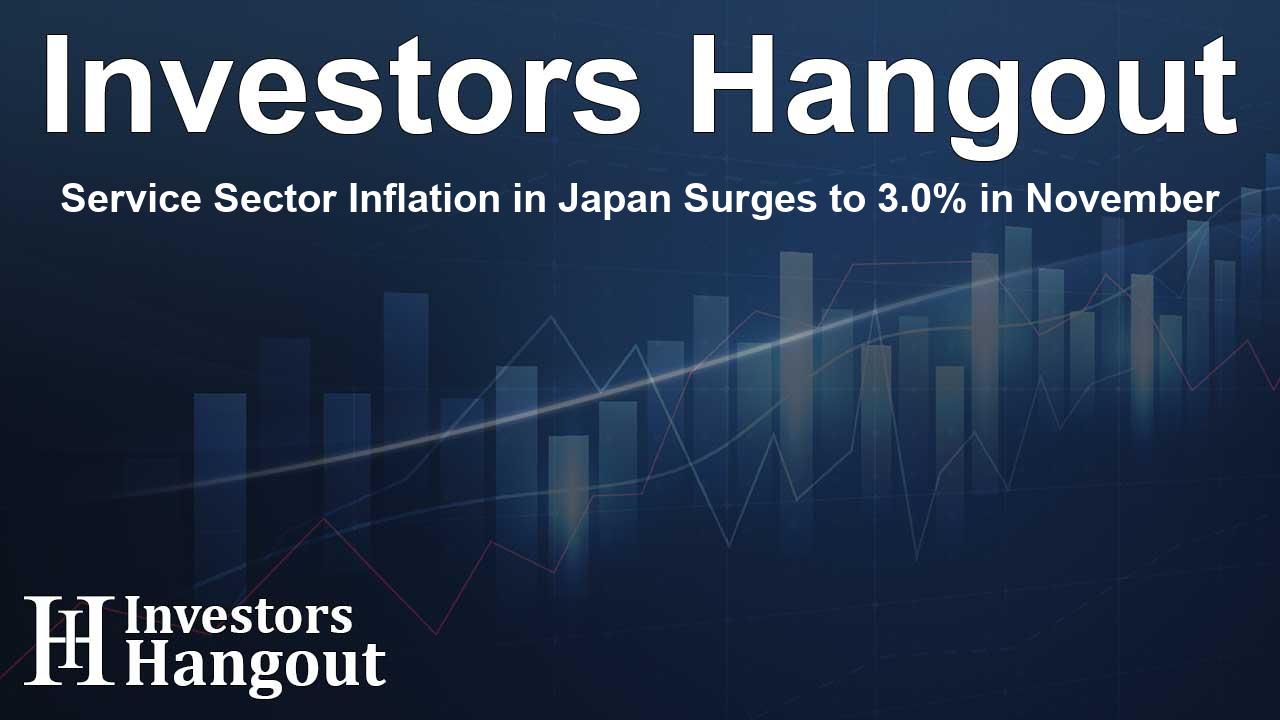Service Sector Inflation in Japan Surges to 3.0% in November

Understanding Japan's Service Sector Inflation Rise
Japan's service sector inflation has recently shown significant acceleration. According to data released, the inflation rate reached 3.0% in November, which marks an uptick for the second consecutive month. This development is noteworthy as it highlights a trend where rising wages are encouraging companies to pass on the costs to consumers.
Impact on the Bank of Japan's Monetary Policy
The Bank of Japan (BOJ) is closely monitoring these inflation figures, as they provide hints about the economy's health and the appropriateness of current monetary policies. A key concern for the BOJ is whether the uptick in service-sector prices signifies broader demand-driven inflation that may justify further interest rate increases.
Service Producer Price Index Insights
Specifically, the services producer price index—a measure of prices charged between companies for services—reflected a year-on-year increase of 3.0%, up from 2.9% in October. This consistent rise in service prices steers the BOJ's decisions regarding monetary policy adjustments and rate hikes.
Recent Actions Taken by the Bank of Japan
In March, the BOJ ended its negative interest rate policy—a measure that had been in place for several years. In July, the short-term policy rate was increased to 0.25% as part of a strategy aimed at achieving a stable inflation rate of 2%. The BOJ, headed by Governor Kazuo Ueda, has communicated a readiness to continue raising rates if conditions support a sustained path towards the inflation target.
Prospects for Inflation and Interest Rates
The outlook for inflation in Japan remains a subject of careful analysis. As inflation rates climb, many are wondering whether the trend will prompt the BOJ to make more aggressive moves regarding interest rates. Given the current economic indicators, the BOJ remains vigilant and prepared to respond accordingly.
Conclusion and Future Considerations
The increase in Japan's service-sector inflation to 3.0% in November is indicative of changing economic dynamics. The ongoing relationship between wage growth, consumer pricing, and BOJ policy will be crucial in shaping Japan's financial landscape. As these factors evolve, stakeholders in the economy will be watching closely for updates from the BOJ and how they impact the broader financial environment.
Frequently Asked Questions
What contributes to the increase in service-sector inflation in Japan?
Increased wages and higher operational costs are key factors contributing to the rise in service-sector inflation in Japan.
How is the Bank of Japan responding to increasing inflation?
The Bank of Japan is monitoring inflation closely and has already adjusted interest rates to support achieving a stable 2% inflation target.
What is the significance of the services producer price index?
The services producer price index measures prices companies charge to each other for services, providing critical insights into inflation trends in the service sector.
What is the Bank of Japan's inflation target?
The Bank of Japan aims for a stable inflation rate of 2% as part of its monetary policy framework to ensure economic stability.
Will interest rates continue to rise in Japan?
If inflation maintains its upward trajectory, the Bank of Japan may consider further rate hikes to manage economic conditions.
About Investors Hangout
Investors Hangout is a leading online stock forum for financial discussion and learning, offering a wide range of free tools and resources. It draws in traders of all levels, who exchange market knowledge, investigate trading tactics, and keep an eye on industry developments in real time. Featuring financial articles, stock message boards, quotes, charts, company profiles, and live news updates. Through cooperative learning and a wealth of informational resources, it helps users from novices creating their first portfolios to experts honing their techniques. Join Investors Hangout today: https://investorshangout.com/
Disclaimer: The content of this article is solely for general informational purposes only; it does not represent legal, financial, or investment advice. Investors Hangout does not offer financial advice; the author is not a licensed financial advisor. Consult a qualified advisor before making any financial or investment decisions based on this article. The author's interpretation of publicly available data shapes the opinions presented here; as a result, they should not be taken as advice to purchase, sell, or hold any securities mentioned or any other investments. The author does not guarantee the accuracy, completeness, or timeliness of any material, providing it "as is." Information and market conditions may change; past performance is not indicative of future outcomes. If any of the material offered here is inaccurate, please contact us for corrections.